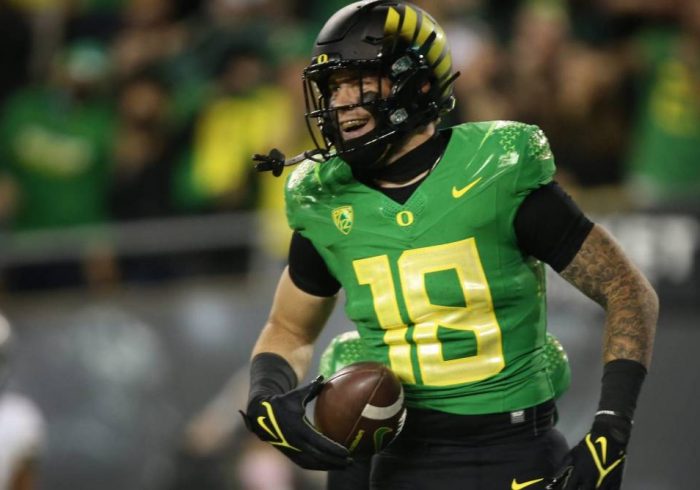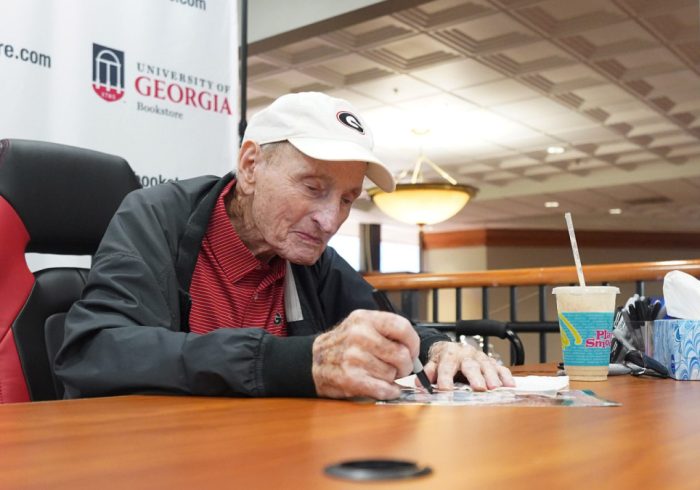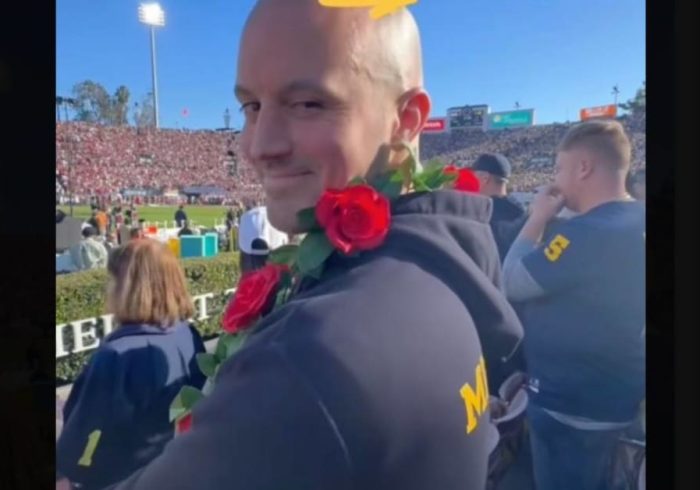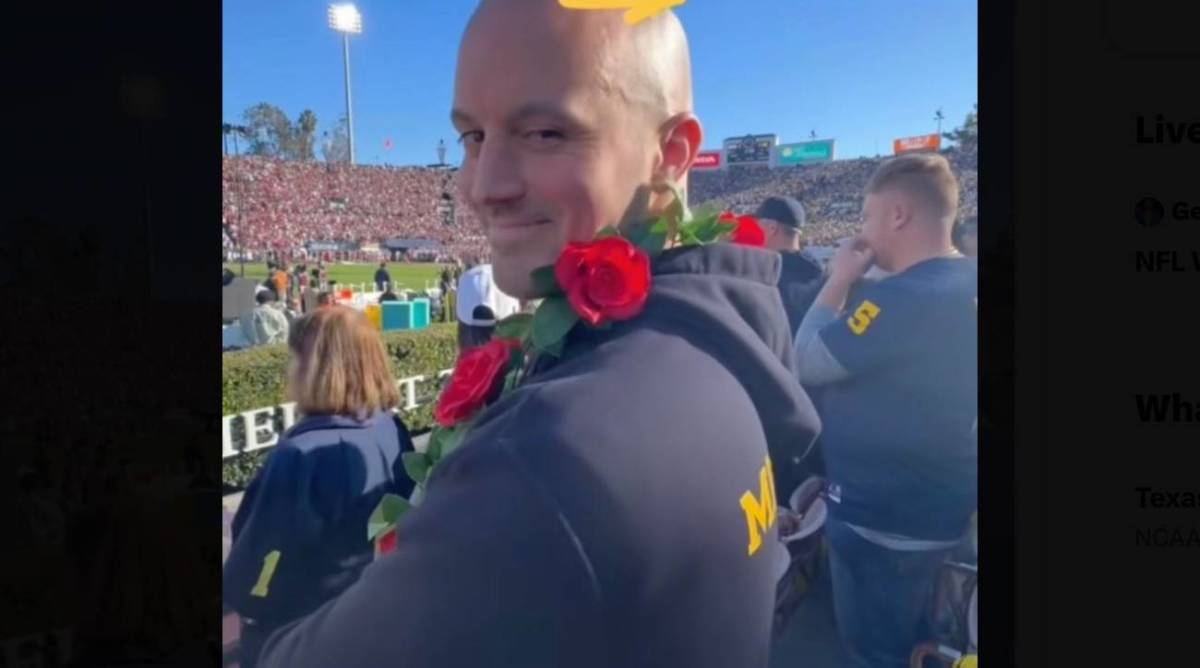With the obliteration of TCU long over and the postgame press conference concluded, Stetson Bennett was standing in one end zone of SoFi Stadium waiting to do a live interview with ESPN’s Scott Van Pelt. Still in uniform, he had a Coke in his hand—with the promise of harder stuff to come later. A family friend had again brought a bottle of Pappy Van Winkle bourbon on the road trip in hopes of reprising last year’s national championship celebration.
The quiet moment presented an opportunity to ask one last question of the Georgia quarterback.
I wanted to know about a crooked index-finger hand signal I saw him give while posing for a postgame picture taken by Bulldogs sports communications staffer Leland Barrow, who has spent much of the past two years shepherding Bennett through an endless succession of interviews as his fame grew. The finger symbol was for a Georgia honor society, Bennett explained, then asked for my notepad.
On it, Bennett wrote: “SVNV.” The signal represented those initials, he explained cryptically, not offering anything more as he walked away to slip on the headset for his interview.
Upon further investigation, Bennett wrote the initials for a Latin saying from the ancient Roman poet Virgil: “Sic vos non vobis.” It roughly translates to, “Thus we work, but not for ourselves.”
If you want a pithy summation of the ultimate walk-on’s Cinderella story, that phrase could apply. Bennett’s work at Georgia lifted so many others: millions of Bulldogs fans who thirsted for a national title for 41 years and wound up getting two of them; a locker room full of wildly talented teammates who all sacrificed for each other; a coach who at first doubted Bennett could play at this level, then became a Stetson believer; his parents, both Georgia grads and rabid fans who nurtured their eldest son’s childhood hope of playing for the Dawgs. The guy nicknamed “The Mailman” delivered to a whole lot of people.
And, yes, Bennett’s work can be the inspiration for countless young people who were told they weren’t good enough to fulfill their lofty goals, in athletics or elsewhere. It’s the stuff of screenplays, an athlete rocketing from universally doubted to universally celebrated, but it’s all real. Bennett chased the dream and wouldn’t be denied—he kept working, retained an ironclad confidence … and won.
“If you are an under-recruited guy, soak that up, but you’ve still got to be the best,” Bennett said. “Go be spiteful out there. Be a dog. You’ve got to. But hopefully in 15 years, there’s some kid out there who is being a stud and he remembers watching us play.”
Bennett threw two touchdown passes and ran for two scores, all in the first half of Monday’s title game.
John W. McDonough/Sports Illustrated
Spiteful dog Stetson Bennett IV ends his endless six-year college career with two national championships and offensive MVP honors from not one, not two, not three, but four College Football Playoff games over the past two seasons. Bennett’s numbers from those victories against Michigan, Alabama, Ohio State and TCU: 78 of 115 for 1,239 yards, 12 touchdowns and one interception. That’s a pass-efficiency rating of 191.02, which by itself would have easily led the nation this season.
The bigger the stakes, the heavier the pressure, the better he played. And as coach Kirby Smart declared after this 65–7 trucking of TCU—the biggest rout in the history of either the CFP or BCS—this was his finest performance.
Bennett shredded the Horned Frogs for 304 passing yards and four touchdowns on just 25 attempts, completing 18 of them. He led Georgia to points on its first six possessions of the game, effectively ending the game long before halftime. Combine that with the three successive scoring drives to pull out the Peach Bowl semifinal victory against Ohio State, and we saw a quarterback operating at the top of his game.
“Some of the checks [audibles] he made, some of the decisions he made, just really elite,” Smart said. “He saw the max blitz and he beat the max blitz and ran for a first down in one of the biggest plays of the game, which takes a phenomenal athlete. He knew what was coming and he set the guy up. He did a change of protection and made an elite throw. He schemed up a run, ran a mid-line run, which nobody runs.
“And when you have a quarterback that can do the protections and check things and know what the defense is doing, yet still beat you with your feet, you’ve got a high-level quarterback. And people have slept on Stetson Bennett for too long. He needs an opportunity to play for a long time at the next level.”
Smart and Georgia became the first program to win back-to-back national titles under the CFP format.
John W. McDonough/Sports Illustrated
That’s the next (and final) frontier—Bennett and the NFL. If he thought there were doubters at the collegiate level, well, here comes another round of them. There will be months of debate.
Some scouts believe he will be drafted and have a solid chance of making a roster, despite his size (he is shorter than his listed 5’11”). At age 25, there might not be much upside left in him—but based on what we’ve seen of him while going 29–3 as a starter, he doesn’t need to improve that much.
Bennett could have tried his hand in the NFL last year, of course, but chose to return. Last January, he walked into Smart’s office and told him about his plan. A lot of people didn’t see the wisdom in that, suspecting he was spoiling a perfect ending. Could Georgia actually repeat after sending a flotilla of talent to the pros?
“[Bennett said to me,] ‘Everybody’s telling me I should just ride off into the sunset, be the legendary quarterback who won a national title,’” Smart recalls. “He’s, like, ‘I don’t get it. Why should I do that when I have an opportunity to play again? Why don’t we go win it again?’
“And I’m kind of thinking, Well, that would be nice but we lost 15 draft picks. Might not be that easy this time. He said, ‘I want to go play. I want to go play football and prove to people this is no fluke. We can do this.’”
To do it, Bennett and his teammates had to submit to the Kirby Smart grind. Which never relents.
The Dawgs will take a 17-game winning streak and a 29–1 record over their past 30 games into 2023.
John W. McDonough/Sports Illustrated
In late June, Georgia football players circulated through Butts-Mehre Heritage Hall wearing T-shirts that read, “Nobody Cares.” Not the friendliest saying, but there was a point behind the Smart-contrived mantra: Nobody wants to hear excuses for not performing and nobody is going to give the Bulldogs anything easy as reigning national champions.
Work harder.
Later that afternoon, the Bulldogs whipped through a crisp situational passing scrimmage, then sweated through a grueling team running drill. They were a magnificent collection of athletes, huge and fast, and they were serious about honing their craft. A long Fourth of July weekend beckoned, and in a couple of weeks the preseason grind would start in earnest, but there was no easing through this getaway day.
There is no easing through anything at Georgia.
“If you like hard,” Smart said months later, “then you’ll fit into our place.”
Here is the hard reality for the rest of college football: The Bulldogs own the sport now. They punctuated an all-time great season with an all-time blowout—perhaps the only thing worse in football championship history was the Chicago Bears beating Washington 73–0 in the 1940 NFL title game.
The College Football Playoff championship game was a complete dud, as the Horned Frogs’ fairy-tale season crashed and burned at the feet of a brutal opponent. This was an utter mismatch everywhere—the line of scrimmage, the backfield, the perimeter, the coaches on the sideline. The Frogs became Georgia’s 15th victim in an undefeated season, and only two of those 15 games were close: the comeback at Missouri in October and the fourth-quarter rally in the Peach Bowl semifinal against Ohio State.
In the end, a third great Playoff game was asking too much. TCU’s upset of Michigan and the Bulldogs’ one-point win against the Buckeyes were thrilling theater, but the bottom line is this: Georgia’s A-game is a mile ahead of everyone else’s. The Bulldogs did not play well against Ohio State and said as much afterward—over and over—but they still won. Poor TCU was treated to Georgia’s bounce-back performance and was overwhelmed from the start.
It was 38–7 at halftime and 52–7 after three quarters, which allowed Smart to call a timeout with 13:25 left to take out Bennett to a standing ovation.
The Bulldogs’ defense didn’t give TCU much breathing room, limiting the Frogs to just 188 yards on 51 plays.
John W. McDonough/Sports Illustrated
The list of those nauseated by this outcome includes the the Buckeyes, who were within inches and seconds of dethroning the Bulldogs; Alabama, which was left out of the Playoff (justifiably) after losses against LSU and Tennessee; and Michigan, which yakked all over itself in the Fiesta Bowl loss to TCU. The Frogs, bless their plucky souls, were all out of pixie dust after so many close and dramatic wins in their 13–2 season.
But amid the criticism this game will surely draw, don’t say college football has a Playoff problem. It has a Georgia problem. Expand to 12 and welcome all the enhancements it will bring—there will be plenty of excitement and draw. But unless or until the Bulldogs regress, these kinds of outcomes could keep coming.
The first repeat champion since Alabama (2011 and ‘12) strongly resembles those Nick Saban–led teams, which had Smart in the defensive coordinator role. The Crimson Tide simply were way better than the competition then, and Georgia is that team now. They can suck the drama out of a big game with ruthless efficiency, as they did while smashing Oregon, Tennessee and LSU and storming through the Southeastern Conference.
The dynasty Dawgs will take a 17-game winning streak and a 29–1 record over their past 30 games into 2023. Replacing Bennett will be a huge task, but the pipeline of talent never runs dry in Athens. Among those returning next season who made big plays against TCU: tight end Brock Bowers (seven catches for 152 yards and a touchdown); wide receiver Ladd McConkey (five catches for 88 yards and two TDs); defensive back Javon Bullard (two interceptions); and defensive lineman Bear Alexander (one sack). They’re all sophomores or freshmen.
“We’ll have a lot of guys coming back,” Smart said. “We’ll lose some really talented guys, probably lose some juniors. But the disease that creeps into your program is called entitlement. I’ve seen it firsthand.
“If you can stomp it out with leadership, then you can stay hungry. And we have a saying around our place: We eat off the floor. And if you’re willing to eat off the floor, you can be special.”
Georgia is the first repeat champion since Alabama in 2011 and ‘12.
John W. McDonough/Sports Illustrated
As celebratory cigar smoke choked the air in the Georgia locker room, Smart went into his office and was greeted by an incongruous sight: his youngest child, 10-year-old Andrew, was bawling his eyes out.
“Why are you crying?” Smart asked him. “You’re ruining my moment.”
“Stetson is leaving,” was Andrew’s reply.
“He’s 25 years old,” Smart responded. “He’s got to go.”
Nothing lasts forever, not even Stetson Bennett’s college football career. But it lasted long enough for a full immersion in glory and joy. His hard work was not just for himself—he lifted his home state and dream school to the highest football heights it has ever known.




